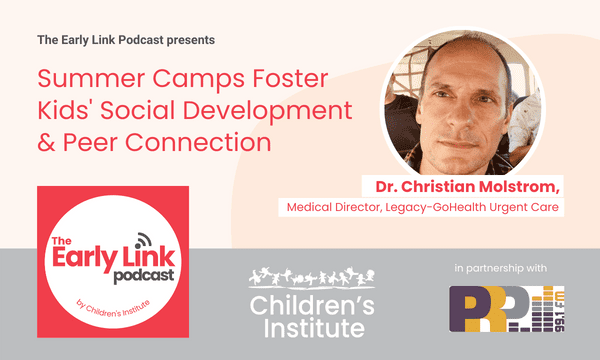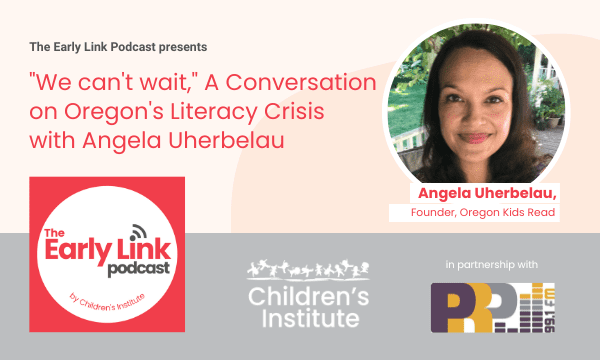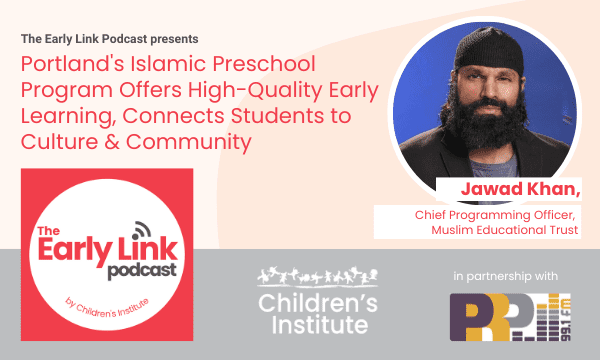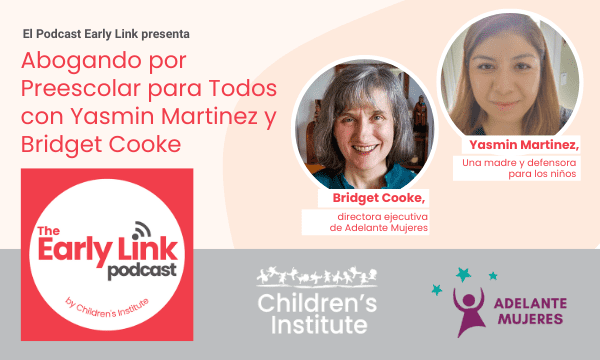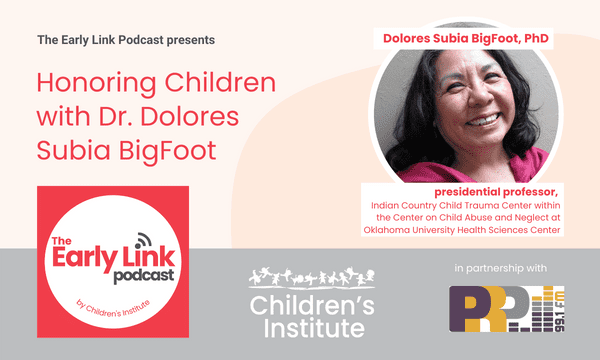
Honoring Children with Dr. Dolores Subia BigFoot
The Early Link is back with an all new episode!
Guest
On this episode of The Early Link Podcast, host Rafael Otto speaks with Dr. Dolores Subia BigFoot. Dr. BigFoot is a presidential professor in the Department of Pediatrics, University of Oklahoma Health Sciences Center, and directs the Indian Country Child Trauma Center where she is recognized for her efforts to bring traditional American Indian practices and beliefs into the formal teaching and instruction of professionals working with Native populations. She is an enrolled member of the Caddo Nation of Oklahoma and affiliated with the Northern Cheyenne Tribe, where her children are enrolled.
Summary
The episode begins with Dr. BigFoot sharing a story about her mother, who had made a comment about all her years going to school only to teach what humans themselves live every day. However, there is a much larger picture, and Dr. BigFoot further elaborates on how her work is informed by the history of colonization, historical trauma, loss and grief. And ultimately how they show up in her work with children and families.
Indigenous culture is primarily honor-based, but Dr. BigFoot has recently observed that shame has replaced honor. She details what this finding means for indigenous culture overall, and how and why evidence-based treatment can help heal that shame and trauma, particularly in children in Indian country. She further states what it has been like to adapt these treatment models and how it was accomplished to begin with.
Closing us out, Dr. BigFoot touches on doing some work here in Oregon on parent-child interaction, and potentially working with tribal communities in Oregon.
Transcript
[00:00:00] Rafael Otto: Hello everyone, this is the Early Link Podcast. I’m Rafael Otto. It’s been a few months since we’ve recorded a new segment, so it’s great to be back behind the mic and hitting record in the studio today. We really appreciate you tuning in.
You can catch us on 99.1FM in the Portland Metro on Sundays at 4:30 PM or tune in at your convenience wherever you find your podcasts, including Apple Podcasts, Spotify, and Amazon Music, and as always, on our website at childinst.org.
Today my guest is Dr. Dolores Subia BigFoot. She’s an enrolled member of the Caddo Nation of Oklahoma with affiliation with the Northern Cheyenne Tribe where her children are enrolled. She’s a Presidential Professor in the Department of Pediatrics, University of Oklahoma Health Sciences Center, and directs the Indian Country Child Trauma Center, where she is recognized for her efforts to bring traditional American Indian practices and beliefs into the formal teaching and instruction of professionals working with Native populations.
Dolores, welcome to the podcast. It’s great to have you here.
[00:01:04] Dolores BigFoot: Thank you.
[00:01:05] Rafael Otto: I wanted to start, you’ve described yourself as a storyteller, and I wanted to ask you to share a story about your mother. She made a comment about all of your years going to school and training to be a psychologist, and then to teach what you live every day. Can you elaborate on that?
[00:01:22] Dolores BigFoot: When I first came on as faculty, some 30 plus years ago. I had finished my PhD and was hired at the University of Oklahoma Health Sciences Center to create a culturally based intervention for behavioral health programs to better serve American Indian, Alaskan Native children. So one of the things that we would do is to help behavioral health clinicians who are working in Indian country to understand the history. So the historical aspects of how our communities have got where they were at currently. Understand the disparities as well as understand particularly the strength. And so in order to share about what the strengths are for various communities, we provided opportunity to engage in some of the cultural experiences that I certainly grew up with.
And that included prayer, feeding people, ceremony, have an opportunity with storytelling to telling stories. And so because it was culturally based, certainly with my family, then my mother and others in my family would be present for these kind of activities. Some ceremonial, some cultural, some social, some all three.
As we were sitting there one evening. My mother who was, you know, very supportive of my efforts, was asking me, why did I go through a PhD program? She saw the, the hardship of that PhD program. I was a single mom with three kids going through a PhD program. And she said, “Why did you go through all that hard time, hard struggle to teach not even teach but just engage and participate and share the way that we have always lived?” For me that was one of the greatest compliments my mother could give to me. So being able to help others experience or participate in things that have meaning in terms of cultural knowledge, in terms of cultural based understanding, cultural based application.
And I think that was what we want to do with the Honor… Honoring Children series is to allow individuals an understanding and how they can still apply the Indigenous knowledge that we have had for a long time to those things that have been harmful or have created dysfunction in our family and in our relationships.
Please download the full transcript below.

